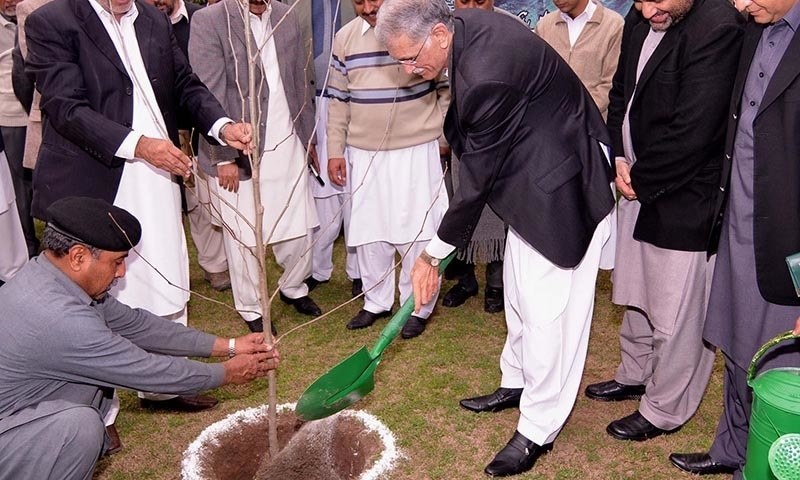PESHAWAR: The ‘Billion-Tree Tsunami’ campaign of PTI-led Khyber Pakhtunkhwa government has been hit by lack of capacity and shortage of funds, prompting the province’s environment department to make a smart move: leave it to the nature to produce enough saplings to achieve the target of planting a billion trees by 2018.
The multi-billion-rupee project — a brainchild of PTI chief Imran Khan — envisages planting of one billion saplings over a period of four years by bringing approximately one million hectares of land under forest cover by 2018.
The province boasts a forest cover of 20.1 per cent, including the forests in Federally Administered Tribal Areas.
Also read: GPS technology to be used to monitor forests: CM
Officials say so far the department has been able to plant 7.2 million saplings against a target of 10.01m for this year.
Under the plan, project managers are required to plant 250m saplings in 2016, 300m in 2017 and 250m in 2018.
According to analysts, the government nurseries in the province have close to four million saplings and the authorities may arrange another 3.4 million saplings from private-sector nurseries. So, there’s a shortfall of 1.8m saplings for the current season.
Taking into account the total number of saplings available in both official and private-sector nurseries, the province would need an additional 242.8m saplings in 2016, 292.8m in 2017 and 242.8m in 2018.
Experts say a seed takes at least two years before it is ready for plantation.
With the total number of saplings available, the target of planting a billion trees may be achieved by 2020 and that too in case the province utilises all the resources at its disposal, say the analysts.
They add that in order to grow one billion plants, the environment department must identify one million hectares of additional land to be covered under the ambitious forestation programme, which it has not done yet.
For meeting the shortfall of saplings, the department is relying on nature.
According to an official, the plan is to protect the existing forests so that 300m saplings could be produced naturally. “We shall adopt measures to protect conifer trees in the high lands of Malakand and Hazara divisions,” Faizul Bari, a director of the project, told Dawn.
“There will be no plantation in protected forests at all,” he said.
“The forests would produce 300m saplings on their own. We don’t need to spend resources if we properly protect our forest reserves,” he said.
The focus of the campaign, therefore, would be on planting fast-growing species on farmlands, particularly those in the southern parts of the province where vast tracts of land are barren.
The critics of the much-publicised campaign, however, point out that species grown on farmland are harvested and are never considered forests. “This is agriculture farming and not forestation,” an expert argued.
“If we were to accept the logic of natural germination, there has been a ban on harvesting of protected forests in the country since 1992. By that logic our forests should have doubled by now,” argued Ijaz Khan, a horticulturist.
“This is a positive step, but its implementation is questionable,” he maintained. “Without human intervention, natural germination in wild forests, especially conifer forests, would be very difficult.
“The environment department grows millions of plants every year but we don’t see a remarkable change. Our forest resources are depleting,” he said.
He said the project had suffered during the current forestation drive due to the shortfall of funds and shortage of nurseries.
The project director acknowledged that there were delays due to the shortage of funds.
The department has now revised its PC-1. It requires Rs1,900 million till June 2015 to prepare itself for the next plantation season. Funds are required for seeds to be provided to owners of 630 private nurseries and other expenditures for coming plantation season.
“Delay in release of funds will definitely affect the plan and like the current season there will be shortage of saplings,” he said.
The data of the Forest Management Centre, an entity of the forest department, show that 35 per cent of the plants do not survive due to reasons like drought-like situation, extensive grazing, unfit soil and scarcity of water.
Mr Bari said that monitoring of the project would be carried out through a Geographical Information System mechanism. Independent monitors and the department’s staff would also monitor progress.
He said that once saplings had been planted the forest department would look after the plants for one year and then local communities would be responsible for them.
Published in Dawn March 25th , 2015
On a mobile phone? Get the Dawn Mobile App: Apple Store | Google Play













































